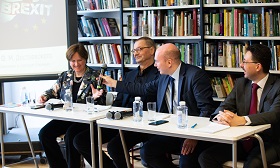Boris Johnson’s first Downing Street speech confirmed his intention to withdraw from the EU on October 31 and to use the remaining 99 days “to do a new deal, a better deal” (an indirect reference to Donald Trump’s “transaction diplomacy”). To be on the safe side, he hastened to lay the blame for the putative breakdown of talks on Brussels. The massive cabinet shakeup he has carried out, with half of the former members, including his rival Jeremy Hunt, either resigning or being dismissed, is a sign that he will ride roughshod. The key posts went to the steadfast Brexiters like Dominic Raab (Foreign Secretary) and Michael Gove (responsible just in case for no-deal Brexit planning).
Boris Johnson’s first Downing Street speech confirmed his intention to withdraw from the EU on October 31 and to use the remaining 99 days “to do a new deal, a better deal” (an indirect reference to Donald Trump’s “transaction diplomacy”). To be on the safe side, he hastened to lay the blame for the putative breakdown of talks on Brussels. The massive cabinet shakeup he has carried out, with half of the former members, including his rival Jeremy Hunt, either resigning or being dismissed, is a sign that he will ride roughshod. The key posts went to the steadfast Brexiters like Dominic Raab (Foreign Secretary) and Michael Gove (responsible just in case for no-deal Brexit planning).
Not accidentally, the media are reporting about a “shock” in Brussels. They have actually cut their route of escape by insisting that the agreement signed by Theresa May cannot be altered. Michel Barnier has only allowed for the possibility of amending the legally non-binding Political Declaration, while the incoming head of the European Commission, Ursula von der Leyen, dropped a highly irrelevant remark that they were prepared to extend London’s EU membership if it provided convincing grounds (!). Testifying to the extent of panic moods and departure from reality is the IMF’s attempt (Christine Lagarde will step in as the ECB head on November 1) to represent a hard Brexit as a threat to the global economy. The EU’s entire negotiating strategy has collapsed after it misfired at the UK Parliament. Nor is it likely to work again.
Boris Johnson made fun of the Northern Ireland’s land border problem: “Never mind the backstop (the reserve regime coordinated with Theresa May, that is, a status quo unacceptable for the Ulster Unionists). I will take personal responsibility for the change I want to see.” A greater insult to the partners could hardly have been imagined. The rumors that Jean-Claude Juncker could arrive at Checkers before the end of this week may be borne out. It is quite certain that London will now be relying on Washington’s support and Washington wields a leverage of its own, including when it comes to tariffs. More than this, supranational Brussels, in Trump’s philosophy, has no right to exist at all.
The British elite will remain split and the gap may even deepen, but the conservative and Euro-skeptical electorate will consolidate. A totally new post-Brexit situation will take shape in the country that will call for a patriotic mobilization on the supra-class basis. (Trump is doing approximately the same thing)
Brexit and a course for a “truly global Britain” will define the new Cabinet’s foreign policy. The British have flipped in the tanker war with Iran. But this matter is more of a concern for John Bolton than for Trump, and Johnson will find a way to stay clear of a military confrontation with Tehran, for which the British simply lack the strength.
In any event, we will witness a resolute disengagement within the Western alliance based on the model of development principle. The Anglo-Saxons will opt for further economic liberalization, whereas Continental Europe will seek to preserve its unity and to uphold the social state. Their rivalry, therefore, will not be equal at the initial stage. The Anglo-Saxons will employ their influence in Eastern Europe to make the EU follow its anti-Russia course, which is essentially an anti-European policy. NATO has also been converted to Trump’s business project and an unfair competition tool.
Opportunities for Russia’s foreign policy in Europe may open up over time, a development that will involve a reappraisal of values on the part of Europe, including in what concerns the balance of benefits and costs related to the continued US presence in European affairs. But as long as the Europeans are not ready for this, things will remain as they are today, including in Russia’s relations with the Anglo-Americans, who are unlikely to give up their harassment against it in Europe, the Middle East, and elsewhere.
It cannot be ruled out that they will attempt to keep us within the former national security paradigm focusing on military and other traditional threats, while domestic development and socioeconomic matters, primarily the standard of living and consumer demand dynamics, are emerging as the key security sphere. By the same token, foreign policy can be still a continuation of domestic policy under new conditions. Trump’s priority is domestic development and therefore there will be no war with Iran.
The stakes will be put on a development race rather than on an arms race, which is a tall order for the Americans themselves and which we seem to have won. They will try to exhaust Russia by the development race and thus make valueless any advances it has made in the field of defense and traditional foreign policy. This will be their asymmetric answer. Our involvement in the debate on liberalism in the wake of Vladimir Putin’s recent interview with The Financial Times could not be more appropriate. It is promoting Russia’s self-determination in the context of this West-West controversy between America and Europe. After all, the social state is an important provision in the Russian Constitution. It would not hurt either to rethink collectively the entire Euro-Atlantic development history, including its Soviet chapter, looking at it through the prism of the current Western societal crisis.
On the whole, Boris Johnson is right when he speaks about a turning-point. This is true for everyone and this opportunity must not be lost.
First published in Valdai Discussion Club.






